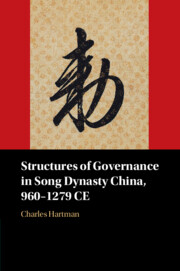Book contents
- Structures of Governance in Song Dynasty China, 960–1279 CE
- Structures of Governance in Song Dynasty China, 960–1279 CE
- Copyright page
- Contents
- Figures
- Tables
- Preface
- Notes on the Cover and on the Text
- Introduction
- Part I Dual Faces of the Song State
- Part II The Technocratic and Confucian Models of Governance
- 6 Agents of Technocracy
- 7 The Northern Song Technocratic State
- 8 The Confucian Challenge
- Part III Interactions
- Appendix of Senior Administration Positions, 1162–1182
- Bibliography
- Index
8 - The Confucian Challenge
from Part II - The Technocratic and Confucian Models of Governance
Published online by Cambridge University Press: 30 March 2023
- Structures of Governance in Song Dynasty China, 960–1279 CE
- Structures of Governance in Song Dynasty China, 960–1279 CE
- Copyright page
- Contents
- Figures
- Tables
- Preface
- Notes on the Cover and on the Text
- Introduction
- Part I Dual Faces of the Song State
- Part II The Technocratic and Confucian Models of Governance
- 6 Agents of Technocracy
- 7 The Northern Song Technocratic State
- 8 The Confucian Challenge
- Part III Interactions
- Appendix of Senior Administration Positions, 1162–1182
- Bibliography
- Index
Summary
Chapter 8, “The Confucian Challenge,” focuses on how the Qingli (1041–1049) reformers sought to strengthen existing agencies and procedures and build new ones that would transform Confucian principles into an active Confucian institutionalism – a functioning administrative system. The advent of a strident Confucianism among a small subset of officials in the 1020s and 1030s directly challenged the ecumenical premises and administrative practices of the Song founders. I focus on how committed Confucian literati worked through four institutions – the Secretariat (Zhongshu 中書), the Censorate (Yushitai御史臺), the Bureau of Policy Criticism (Jianyuan 諫院), and the Academies and Institutes (guan’ge 館閣) – to create a new conception of Song “shared governance” (gongzhi tianxia 共治天下). These efforts attempted to replace the earlier notion of personal loyalty to the ruler with a broader concept of loyalty to principles and practices often described as the “essential body of the state” (guoti 國體) or as “public, or impartial, opinion” (gonglun 共論). The moral attainments of Confucian education replaced raw “talent” as a basic qualification for office. The notion of guoti gave preference to ordered hierarchies of offices, each with a defined relationship to the other.
Keywords
- Type
- Chapter
- Information
- Structures of Governance in Song Dynasty China, 960–1279 CE , pp. 229 - 262Publisher: Cambridge University PressPrint publication year: 2023

